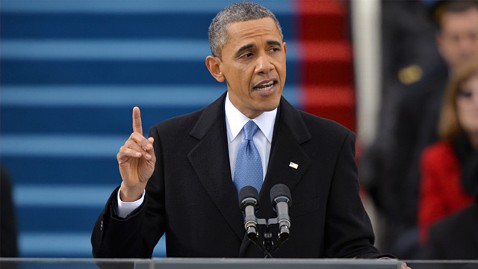House Republicans slammed Secretary of State Hillary Clinton today for her lack of awareness of State Department cables warning of security threats in Benghazi, Libya, prior to the Sept. 11 attack that killed four Americans, including Amb. Chris Stevens.
In the second congressional hearing of the day reviewing a report by the Accountability Review Board on the State Department's security failures, Rep. Michael McCaul, R-Texas, asked Clinton this afternoon why her office had not responded to a notification from Stevens about potential dangers in Libya.
"Congressman, that cable did not come to my attention," Clinton calmly told the House Foreign Affairs Committee hours after her Senate testimony this morning. "I'm not aware of anyone within my office, within the secretary's office having seen that cable."
She added that "1.43 million cables come to my office. They're all addressed to me."
Hillary Clinton's Fiery Moment at Benghazi Hearing
Rep. Matt Salmon, R-Ariz., asked Clinton whether she thought that signaled the need for a shifting of priorities to make sure she is notified about these kinds of threats in the future.
"That's exactly what I'm intent on doing," Clinton said. "We have work to do. We have work to do inside the department. We have work to do with our partners in DOD and the intelligence community."
Such answers failed to appease members like Rep. Jeff Duncan, R-S.C., who accused Clinton of letting "the consulate become a death trap."
Clinton also told the House committee that an emphasis on security in Iraq and Afghanistan in the past decade diverted resources from other outposts around the world.
She told Rep. Chris Smith, R-N.J., that legislation he championed reorganizing the State Department in the 19990s had "been very important in protecting our people around the world," but that the need for funding was ongoing and unmet.
Clinton reprised her role as defender of the State Department this afternoon in the second half of congressional testimony on the security failures that led to the deaths of Stevens and the other Americans.
Stevens understood the significance of the mission, she told the committee several hours after a morning Senate appearance.
"That's why Chris Stevens went to Benghazi in the first place," she said. "Nobody knew the dangers better than Chris, first during the revolution and then during the transition. A weak Libyan government, marauding militias, even terrorist groups … a bomb exploded in the parking lot of his hotel. He never wavered. He never asked to come home. He never said let's shut it down, quit, go somewhere else."
Representatives repeatedly asked about U.N. Ambassador Susan Rice's assertion on Sunday morning talk shows in September that the attack was fueled by outrage over a video attacking Islam.
Chip Somodevilla/Getty Images
Hillary Clinton Cites Lack of Funding in Global Outposts Watch Video
Clinton: Security Request Not Brought to My Attention Watch Video
Hillary Clinton Gets Choked Up at Benghazi Hearing Watch Video
Clinton's response was to refer to the ARB report, which said the motivations behind the attack were complicated and still not all known. She maintained that Rice was speaking based upon talking points given to her by the intelligence community.
Rep. Joe Wilson, R-S.C., asked why the secretary of state herself did not appear in Rice's place to give those televised explanations to the country.
"Well, I have to confess here in public [that] going on the Sunday shows is not my favorite thing to do. There are other things that I prefer to do on Sunday mornings," Clinton replied. "And I did feel strongly that we had a lot that we had to manage, that I had to respond to. And I thought that should be my priority."
The afternoon appearance followed morning testimony from an energized Clinton, who stood her ground and told the Senate Foreign Relations Committee that she has overseen plans to secure diplomatic outposts around the world while cuts in State Department funding undermine those efforts.
Citing a report by the department's Accountability Review Board on the security failures that led to the deaths of four Americans in Benghazi, Libya, during an attack last year, Clinton said the board is pushing for an increase in funding to facilities of more than $2 billion per year.
"Consistent shortfalls have required the department to prioritize available funding out of security accounts," Clinton told the Senate this morning, while again taking responsibility for the Benghazi attack. "And I will be the first to say that the prioritization process was at times imperfect, but as the ARB said, the funds provided were inadequate. So we need to work together to overcome that."
Clinton, showing little effect from her recent illnesses, choked up earlier in discussing the Benghazi attack.
"I stood next to President Obama as the Marines carried those flag-draped caskets off the plane at Andrews," Clinton said this morning, her voice growing hoarse with emotion. "I put my arms around the mothers and fathers, sisters and brothers, sons and daughters."
The outgoing secretary of state was the only witness to giving long-awaited testimony before the Foreign Relations Committee this morning, and appeared before the House Foreign Affairs Committee at 2 p.m.
The secretary, who postponed her testimony in December, started today by giving context to the terrorist attack.
"Any clear-eyed examination of this matter must begin with this sobering fact," Clinton began. "Since 1988, there have been 19 Accountability Review Boards investigating attacks on American diplomats and their facilities."
But the secretary did not deny her role in the failures, saying that as secretary of state, she has "no higher priority and no greater responsibility" than protecting American diplomats abroad like those killed in Benghazi.
"As I have said many times, I take responsibility, and nobody is more committed to getting this right," Clinton said. "I am determined to leave the State Department and our country safer, stronger and more secure."
Among the steps Clinton has taken, she said, is to "elevate the discussion and the decision-making to make sure there's not any" suggestions that get missed, as there were in this case.
Clinton testified that the United States needs to be able to "chew gum and walk at the same time," working to shore up its fiscal situation while also strengthening security, and she refuted the idea that across-the-board cuts slated to take place in March, commonly referred to as sequestration, were the way to do that.
"Now sequestration will be very damaging to the State Department and USAID if it does come to pass, because it throws the baby out with the bath," Clinton said, referring to the United States Agency for International Development, which administers civilian foreign aid.
While the State Department does need to make cuts in certain areas, "there are also a lot of very essential programs … that we can't afford to cut more of," she added.
More than four months have passed since the attack killed U.S. Ambassador Christopher Stevens and three other Americans in Libya. These meetings, during which Clinton discussed the report on State Department security failures by the Accountability Review Board, were postponed because of her recent illness.
Clinton told the Senate that the State Department is on track to have 85 percent of action items based on the recommendations in the ARB report accomplished by March, with some already implemented.













